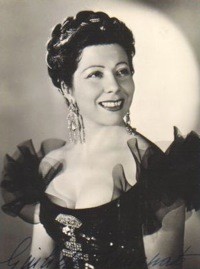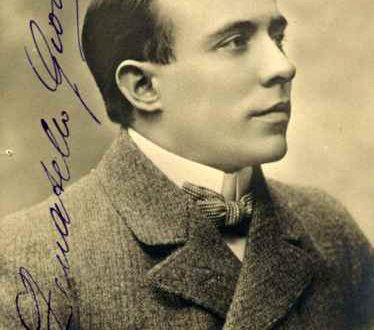
Giulietta Simionato |
Giulietta Simionato

Those who knew and loved Juliet Simionato, even if they had not heard her in the theater, were sure that she was destined to live to be a hundred years old. It was enough to look at the photo of the gray-haired and invariably elegant singer in a pink hat: there was always slyness in her facial expression. Simionato was famous for her sense of humor. And yet, Juliet Simionato died just a week before her centenary, on May 5, 2010.
One of the most famous mezzo-sopranos of the twentieth century was born on May 12, 1910 in Forlì, in the region of Emilia-Romagna, about halfway between Bologna and Rimini, in the family of a prison governor. Her parents were not from these places, her father was from Mirano, not far from Venice, and her mother was from the island of Sardinia. In her mother’s home in Sardinia, Juliet (as she was called in the family; her real name was Julia) spent her childhood. When the girl was eight years old, the family moved to Rovigo, the center of the province of the same name in the Veneto region. Juliet was sent to a Catholic school, where she was taught painting, embroidery, culinary arts, and singing. The nuns immediately drew attention to her musical gift. The singer herself said that she always wanted to sing. To do this, she locked herself in the bathroom. But it was not there! Juliet’s mother, a tough woman who ruled the family with an iron fist and often resorted to punishing children, said that she would rather kill her daughter with her own hands than allow her to become a singer. Signora, however, died when Juliet was 15 years old, and the barrier to the development of the miraculous gift collapsed. The future celebrity began to study in Rovigo, then in Padua. Her teachers were Ettore Locatello and Guido Palumbo. Giulietta Simionato made her debut in 1927 in Rossato’s musical comedy Nina, Non fare la stupida (Nina, don’t be stupid). Her father accompanied her to the rehearsals. It was then that the baritone Albanese heard her, who predicted: “If this voice is properly trained, the day will come when theaters will collapse from applause.” Juliet’s first performance as an opera singer took place a year later, in the small town of Montagnana near Padua (by the way, Toscanini’s favorite tenor Aureliano Pertile was born there).
Simionato’s career development is reminiscent of the popular proverb “Chi va piano, va sano e va lontano”; its Russian equivalent is “Slower ride, further you will.” In 1933, she won the vocal competition in Florence (385 participants), the president of the jury was Umberto Giordano, author of Andre Chenier and Fedora, and its members were Solomiya Krushelnitskaya, Rosina Storchio, Alessandro Bonci, Tullio Serafin. On hearing Juliet, Rosina Storchio (the first performer of the role of Madama Butterfly) said to her: “Always sing like that, my dear.”
The victory in the competition gave the young singer the opportunity to audition at La Scala. She signed her first contract with the famous Milan theater in the 1935-36 season. It was an interesting contract: Juliet had to learn all the minor parts and be present at all rehearsals. Her first roles at La Scala were Mistress of the Novices in Sister Angelica and Giovanna in Rigoletto. Many seasons have passed in responsible work that does not bring much satisfaction or fame (Simionato sang Flora in La Traviata, Siebel in Faust, the little Savoyard in Fyodor, etc.). Finally, in 1940, the legendary baritone Mariano Stabile insisted that Juliet should sing the part of Cherubino in Le nozze di Figaro in Trieste. But before the first truly significant success, it was necessary to wait another five years: it was brought to Juliet by the role of Dorabella in Così fan tutte. Also in 1940, Simionato performed as Santuzza in Rural Honor. The author himself stood behind the console, and she was the youngest among the soloists: her “son” was twenty years older than her.
And finally, a breakthrough: in 1947, in Genoa, Simionato sings the main part in Tom’s opera “Mignon” and a few months later repeats it at La Scala (her Wilhelm Meister was Giuseppe Di Stefano). Now one can only smile when reading the responses in the newspapers: “Giulietta Simionato, whom we used to see in the last rows, is now in the first, and so it should be in justice.” The role of Mignon became a landmark for Simionato, it was in this opera that she made her debut at La Fenice in Venice in 1948, and in Mexico in 1949, where the audience showed ardent enthusiasm for her. The opinion of Tullio Serafina was even more important: “You have made not only progress, but real somersaults!” Maestro said to Giulietta after the performance of “Così fan tutte” and offered her the role of Carmen. But at that time, Simionato did not feel mature enough for this role and found the strength to refuse.
In the 1948-49 season, Simionato first turned to the operas of Rossini, Bellini and Donizetti. Slowly, she reached true heights in this kind of operatic music and became one of the most prominent figures of the Bel Canto Renaissance. Her interpretations of the roles of Leonora in The Favorite, Isabella in The Italian Girl in Algiers, Rosina and Cinderella, Romeo in Capuleti and Montagues and Adalgisa in Norma remained standard.
In the same 1948, Simionato met Callas. Juliet sang Mignon in Venice, and Maria sang Tristan and Isolde. A sincere friendship arose between the singers. They often performed together: in “Anna Boleyn” they were Anna and Giovanna Seymour, in “Norma” – Norma and Adalgisa, in “Aida” – Aida and Amneris. Simionato recalled: “Maria and Renata Tebaldi were the only ones who called me Giulia, not Juliet.”
In the 1950s, Giulietta Simionato conquered Austria. Her links with the Salzburg Festival, where she often sang under the baton of Herbert von Karajan, and the Vienna Opera were very strong. Her Orpheus in Gluck’s opera in 1959, captured in a recording, remains the most unforgettable evidence of her collaboration with Karajan.
Simionato was a universal artist: the “sacred” roles for mezzo-sopranos in Verdi’s operas – Azucena, Ulrika, Princess Eboli, Amneris – worked out for her as well as the roles in romantic bel canto operas. She was the playful Preciosilla in The Force of Destiny and the hilarious Mistress Quickly in Falstaff. She has remained in the annals of opera as the excellent Carmen and Charlotte in Werther, Laura in La Gioconda, Santuzza in Rustic Honour, the Princess de Bouillon in Adrienne Lecouvrere and the Princess in Sister Angelica. The high point of her career is associated with the interpretation of the soprano role of Valentina in Meyerbeer’s Les Huguenots. The Italian singer also sang Marina Mnishek and Marfa in Mussorgsky’s operas. But over the years of her long career, Simionato performed in operas by Monteverdi, Handel, Cimarosa, Mozart, Gluck, Bartok, Honegger, Richard Strauss. Her repertoire has reached astronomical figures: 132 roles in the works of 60 authors.
She had a huge personal success in Berlioz’s Les Troyens (first performance at La Scala) in 1960. In 1962, she participated in the farewell performance of Maria Callas on the stage of the Milan theater: it was Cherubini’s Medea, and again old friends were together, Maria in the role of Medea, Juliet in the role of Neris. In the same year, Simionato appeared as Pirene in De Falla’s Atlantis (she described her as “too static and non-theatrical”). In 1964, she sang Azucena in Il trovatore at Covent Garden, a play staged by Luchino Visconti. Meeting with Maria again – this time in Paris, in 1965, in Norma.
In January 1966, Giulietta Simionato left the opera stage. Her last performance took place in the small part of Servilia in Mozart’s opera “The Mercy of Titus” on the stage of the Teatro Piccola Scala. She was only 56 years old and was in excellent vocal and physical shape. Too many of her colleagues lacked, lacked, and lacked the wisdom and dignity to take such a step. Simionato wanted her image to remain beautiful in the memory of the audience, and achieved this. Her departure from the stage coincided with an important decision in her personal life: she married a famous doctor, Mussolini’s personal surgeon Cesare Frugoni, who cared for her for many years and was thirty years older than her. Behind this finally accomplished marriage was the singer’s first marriage to the violinist Renato Carenzio (they separated in the late 1940s). Frugoni was also married. Divorce did not exist in Italy at that time. Their marriage became possible only after the death of his first wife. They were destined to live together for 12 years. Frugoni died in 1978. Simionato remarried, linking her life with an old friend, industrialist Florio De Angeli; she was destined to outlive him: he died in 1996.
Forty-four years away from the stage, from applause and fans: Giulietta Simionato has become a legend during her lifetime. The legend is alive, attractive and crafty. Several times she sat on the jury of vocal competitions. At the concert in honor of Carl Böhm at the Salzburg Festival in 1979, she sang Cherubino’s aria “Voi che sapete” from Mozart’s Le nozze di Figaro. In 1992, when director Bruno Tosi founded the Maria Callas Society, she became its honorary president. In 1995, she celebrated her 95th birthday on the stage of the La Scala Theatre. The last journey that Simionato made at the age of 2005, in XNUMX, was dedicated to Maria: she could not help honoring with her presence the ceremony of the official opening of the walkway behind the La Fenice theater in Venice in honor of the great singer and old friend.
“I feel neither nostalgia nor regret. I gave everything I could to my career. My conscience is at peace.” This was one of her last statements to appear in print. Giulietta Simionato was one of the most important mezzo-sopranos of the twentieth century. She was the natural heir of the incomparable Catalan Conchita Supervia, who is credited with reviving Rossini’s repertoire for the low female voice. But the dramatic Verdi roles succeeded Simionato no less. Her voice was not too large, but bright, unique in timbre, impeccably even throughout the entire range, and she mastered the art of giving an individual touch to all the works that she performed. Great school, great vocal stamina: Simionato recalled how she once went on stage for 13 consecutive nights, at the Norma in Milan and the Barber of Seville in Rome. “At the end of the performance, I ran to the station, where they were waiting for me to give a signal for the train to depart. On the train, I took off my make-up. An attractive woman, a lively person, an excellent, subtle, feminine actress with a great sense of humor. Simionato knew how to admit her shortcomings. She was not indifferent to her own successes, collecting fur coats “like other women collect antiques”, in her own words, she admitted that she was jealous and liked to gossip about the details of the personal lives of her fellow rivals. She felt neither nostalgia nor regret. Because she managed to live life to the fullest and remain in the memory of her contemporaries and descendants as an elegant, ironic, the embodiment of harmony and wisdom.





